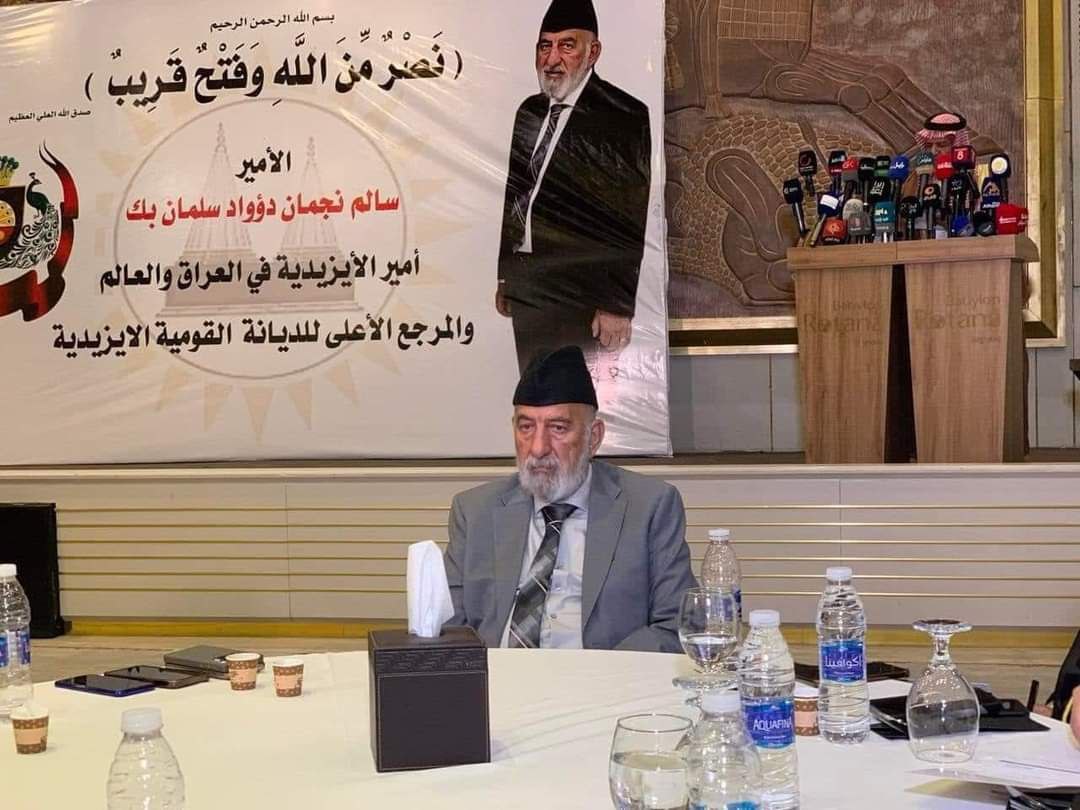The Endowments Office of the Christian, Ezidi (Yazidi) and Sabian-Mandaean religions in Baghdad refuses to deal with the Ezidi figure who declared himself in the middle of this month “the new Emir of the Ezidis”, in the capacity of a prince.
This comes after that figure was prevented last Thursday from holding the ceremony of assuming the position in the Shrine of Sharaf al-Din in Shingal (Sinjar), home for the non-Muslim Ezidi community in Nineveh Province.
Salem Najman declared himself Emir of the Ezidis in a ceremony held on April 15, 2024 in Baghdad, at a time when Hazim Tahsin Beg had been appointed Emir of the Ezidis in Iraq and the world in July 2019, an inauguration that was recognized by the Ezidi Spiritual Council.
Last Thursday, April 25, Salem Najman visited Shingal district in order for the religious ceremonies for his inauguration to take place at Sharaf al-Din Shrine, but those in charge of the temple refused to receive him as an emir.
Saleh Khalaf, from Sharaf al-Din Shrine’s media, told KirkukNow, “Salem Najman called me on the phone and said that he would come to Sharaf al-Din Shrine. We said we have no problem with that and he can visit us, but not as the Emir of the Ezidis.”
On the same day, Salem Najman said in a press conference in Shingal, “Some prevented my inauguration ceremony as emir in the Shrine of Sharaf al-Din. We prepared for the ceremony, but there is an agenda that rejects us. I do not know if it is a Kurdish, Arab, or political agenda.”
But Saleh Khalaf affirmed, “What happened was not a ban. Rather, we told him that he cannot act inside the shrine as a prince and have appointment ceremonies organized for him.”
“Sharaf al-Din Shrine is a very sacred religious shrine... This place is not designated for the installation of princes. If he wants to do a charity work it is fine but we will not allow this shrine to be used for other purposes.”
A part of the Ezidi community, including religious and social figures and a number of the tribal clans, refuse to recognize the election of the Emir and Baba Sheikh (spiritual leader) of the Ezidis, because their views are not taken into account.
Following the death of Mir Tahsin Beg, former Ezidi Emir (Prince), the Ezidis were divided into two fronts, Shingal and Sheikhan, with affiliation to several different political parties.
Although Najman has repeatedly stated that he has an official letter from Baghdad confirming his recognition as emir, he has not yet published any official letter regarding his inauguration.
Dasan Qawwal, deputy head of the Office of Endowments for the Christian, Ezidi, and Sabian-Mandaean Religions in Baghdad, told (KirkukNow), “The Ezidi emirate exists for more than a thousand years, and since then until now had only one prince.”
“Currently, the prince’s family has installed Hazim Tahsin as a prince and he has received the approval of the Spiritual Council and the clan heads, so there cannot be two princes,” Qawwal added.
"The person who declared himself from Baghdad as the prince of the Ezidis is not a prince. He does not have an official letter recognizing him as a prince, and the issuance of the presidential decree on these matters has also stopped... Even Prince Hazem Tahseen Beg has not been issued a presidential decree, but he has the support of the Ezidi Spiritual Council, and when he visited Baghdad, the government and embassies treated him as an emir.”
In August 2019, a number of Ezidi clerics and notables met in the Shabil Qasim shrine in Shingal and decided to name Naif Daoud Salman as Emir of Shingal and to form an emirate in the district subject to the authority of the Iraqi central government.
The election of the Emir of the Ezidis in Iraq and the world takes place through several stages after selecting a candidate from within the Emir family, and in the last stage the final word is given to the Ezidi Spiritual Council.
The Ezidi administration institution is made up of the Ezidi Spiritual Council, prince of Ezidis (Mir) who is the head of the spiritual council (leader of the community), Baba-Sheikh (the key religious figure), Key Minister (Sheikh Al-Wazir), and head of the seniors (Qawwalin). They unanimously form the council and take the decisions.
Ezidis are an ethno-religious minority over half a million population, mostly residing in Shingal, in northern Iraqi province of Ninewa, and Shekhan district of Duhok Northern Province. The militants of Daesh extremist group in 2014 attacked their communities accusing them of being heretics, killing thousands of men and taking thousands of women and children as sex slaves, in an atrocity the U.N. described as genocide.
In the wake of the attacks on Shingal and other areas of Ninewa province by the extremist militants of the Islamic State of Iraq and Syria ISIS, more than 350,000 Ezidis were displaced, 100,000 of whom migrated at the time outside Iraq. About 200,000 are still living in IDP camps in the Kurdistan Region of Iraq KRI up today.





